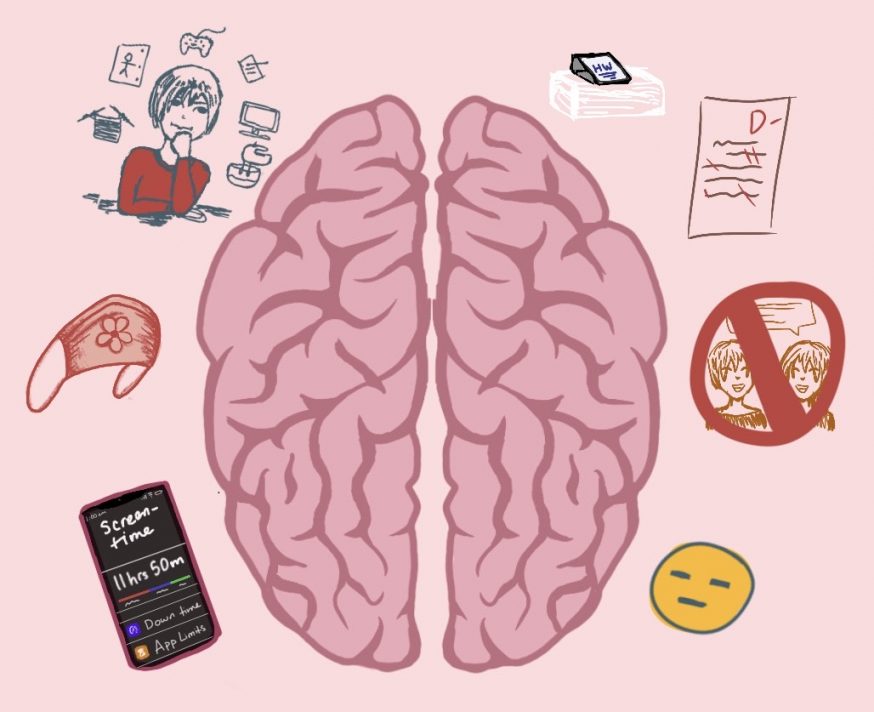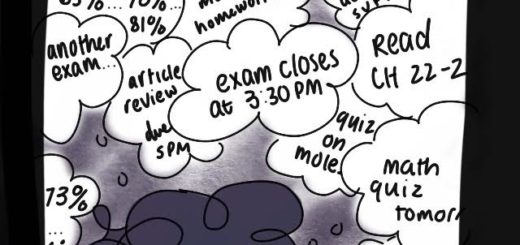The pandemic is worsening our mental health
 Sallaria Ansong | Conant Crier
Sallaria Ansong | Conant Crier Research shows that the pandemic is taking a toll on everyone’s mental health.
Ever since Gov. Pritzker announced “quarantine” on March 20th, we have become familiar with the feeling of being trapped in our own homes. That was 7 months ago.
Are you the same person you were back in March? Chances are this pandemic has impacted all of us in ways we couldn’t anticipate at the time, and the effects are worse than expected.
Since this pandemic will likely leave a lasting effect on us psychologically, researchers have begun to conduct studies on what the effects of the pandemic may be. Even though the pandemic has been going on for less than a year, these researchers have already found alarming changes in human psychology as a result of the pandemic.
For many, stress may be the main contributing factor towards these changes in human psychology. For all high school students, there will always be the stress of performing well in your classes or getting the score you want on a test. However, with the pandemic, there are other stressors on our mind such as a parent losing a job or learning remotely for school.
These drastic changes in stress levels are bound to impact teenagers more (or less) than others. According to a survey conducted by Psychologist Sam Dekin, over 50% of the teenagers that took the survey said that they were experiencing high anxiety and 43% said that they were dealing with depression as a result of the pandemic.
Normal stress combined with pandemic-related stress is bound to push the limits of what we can handle mentally. That is why if we don’t manage to control it, there will be negative effects that will permanently affect us as people.
Neuroscientist Bruce S. McEwen studied the impact of stress on the brain and discovered that stress has a negative effect on brain development for people under 25 by permanently altering connections to the brain.
When these connections are altered, it will cause a person’s overall behavior to change. Some of these changes include having trouble focusing in school and recalling memories. These effects may even become permanent because of the mounting stress caused by these uncertain circumstances.
In a study on the short and long-term effects of poor mental health conducted by PsychGuides, these effects can vary from distancing yourself from those closest to you to abrupt changes in mood. While these effects may not seem all that alarming, they could spiral into very grave conditions such as depression.
In the future, this might evolve into a larger issue if we don’t start using coping strategies that can relieve this stress. Luckily, there are ways that we can prevent these short term effects from leading into something more dire.
Some coping strategies that the staff from the Center for Disease Control and Prevention found helpful include doing something you love, such as unwinding with a good book or watching TV.
You could also talk to a trained professional or get help from a trusted adult. Some of the helpful resources that we offer here at Conant include meeting with a counselor, joining student support groups, or meeting with a social worker. If you are struggling during this time, remember that you are not alone. That is why we all must trudge through this together, because it is the only way that we’ll get through this.
Despite what some may believe, the negative effects the pandemic has on us will continue to impact us even when the pandemic is over. Not everyone is in the same boat, so one can’t assume that everyone will come out of this pandemic with the same mental health they had going into it. If we don’t accept this, then we would just be lying to ourselves.




Thank you for this enlightening article! We don’t know how people are coping with the stress of the pandemic. Some people are affected more than others. We will get through this together.